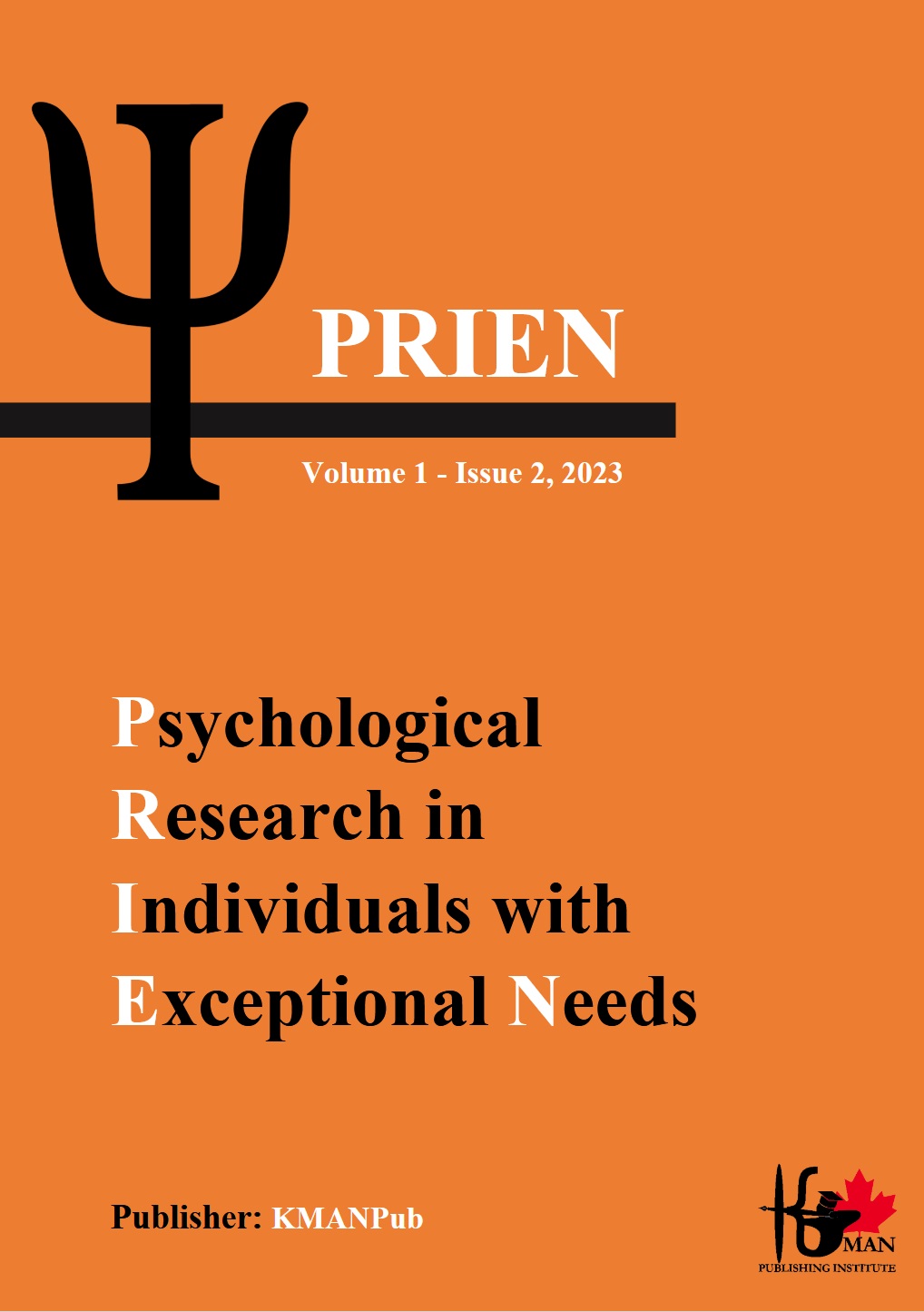Cognitive Failures and Sense of Coherence as Predictors of Academic Resilience in Children with Speech Impairments
Keywords:
Academic resilience, cognitive failures, sense of coherence, speech impairments, children, cross-sectional study, psychological factors, educational interventionsAbstract
This study aims to investigate the relationship between cognitive failures, sense of coherence, and academic resilience in children with speech impairments. The objective is to determine how cognitive and psychological factors predict resilience in this population. A cross-sectional design was employed, involving 376 children with speech impairments, aged 8 to 12 years. Participants were recruited from special education centers and mainstream schools. Academic resilience, cognitive failures, and sense of coherence were measured using the Academic Resilience Scale (ARS-30), Cognitive Failures Questionnaire (CFQ), and Sense of Coherence Scale (SOC-29), respectively. Pearson correlation analysis examined the relationships between variables, and linear regression analysis determined the predictive value of cognitive failures and sense of coherence on academic resilience. Data analysis was conducted using SPSS version 27. Descriptive statistics indicated moderate levels of academic resilience (M = 78.45, SD = 11.32) among participants. Cognitive failures (M = 43.29, SD = 9.87) negatively correlated with academic resilience (r = -0.56, p < .001), while sense of coherence (M = 65.14, SD = 10.45) positively correlated (r = 0.63, p < .001). The regression model was significant (F(2, 373) = 173.27, p < .001), explaining 48% of the variance in academic resilience (R² = 0.48). Cognitive failures (B = -0.45, p < .001) and sense of coherence (B = 0.59, p < .001) were significant predictors of academic resilience. The findings underscore the significant roles of cognitive failures and sense of coherence in predicting academic resilience in children with speech impairments. Interventions targeting cognitive improvement and psychological support can enhance resilience, thereby promoting better academic outcomes. Future research should explore longitudinal trajectories and the effectiveness of specific interventions to further support these children.
Downloads
References
Aghajani, S., & Samadifard, H. R. (2019). The Role of Cognitive Failures, Alexithymia and Cognitive Flexibility in Predicting the Social Health of Elderly [Research]. Advances in Cognitive Sciences, 20(4), 62-69.http://icssjournal.ir/article-1-860-en.html
Akhmetzyanova, A. I., Artemyeva, T., Сальникова, И. В., & Лемех, Е. А. (2021). Structural and Functional Characteristics of Prediction in Preschool Children With Speech Impairment. Education & Self Development, 16(3), 398-419.https://doi.org/10.26907/esd.16.3.31
Al‐Yagon, M., & Mikulincer, M. (2004). Patterns of Close Relationships and Socioemotional and Academic Adjustment Among School‐Age Children With Learning Disabilities. Learning Disabilities Research and Practice, 19(1), 12-19.https://doi.org/10.1111/j.1540-5826.2004.00085.x
Fang, G., Chan, P. W. K., & Kalogeropoulos, P. (2020). Social Support and Academic Achievement of Chinese Low- Income Children: A Mediation Effect of Academic Resilience. International Journal of Psychological Research, 13(1), 19-28.https://doi.org/10.21500/20112084.4480
Hosseinnezhad, A., Abolghasemi, S., Vatankhah, H. R., & Khalatbari, J. (2021). Comparing the Effects of Parent Behavior Management and Anger Management Training on Academic Resilience and Parent-Child Relationship in Students with Attention-Deficit/Hyperactivity Disorder. MEJDS, 11(0), 89-89.http://jdisabilstud.org/article-1-2111-en.html
Kakemam, E., Kalhor, R., Khakdel, Z., Khezri, A., West, S., Visentin, D., & Cleary, M. (2019). Occupational Stress and Cognitive Failure of Nurses and Associations With Self‐reported Adverse Events: A National Cross‐sectional Survey. Journal of Advanced Nursing, 75(12), 3609-3618.https://doi.org/10.1111/jan.14201
Khajekini, T. B., Tjjalli, P., & Shariatbagheri, M. M. (2022). Effectiveness of Acceptance and Commitment Therapy on Academic Resilience of Children With Physical-Motor Disabilities and Their Mothers’ Life Expectancy. Scientific Journal of Rehabilitation Medicine, 11(2), 210-221.https://doi.org/10.32598/sjrm.11.2.3
Leffel, K. R., & Suskind, D. L. (2013). Parent-Directed Approaches to Enrich the Early Language Environments of Children Living in Poverty. Seminars in Speech and Language, 34(04), 267-278.https://doi.org/10.1055/s-0033-1353443
Li, Y., Jin, Y., Kong, H., Feng, C., Cao, L., Li, T., & Wang, Y. (2023). The Relationship Between Meaning in Life and Depression Among Chinese Junior High School Students: The Mediating and Moderating Effects of Cognitive Failures and Mindfulness. International journal of environmental research and public health, 20(4), 3041.https://doi.org/10.3390/ijerph20043041
Liew, J., Cao, Q., & Deutz, M. H. F. (2018). Academic Resilience Despite Early Academic Adversity: A Three-Wave Longitudinal Study on Regulation-Related Resiliency, Interpersonal Relationships, and Achievement in First to Third Grade. Early Education and Development, 29(5), 762-779.https://doi.org/10.1080/10409289.2018.1429766
Manly, J. T., Lynch, M., Oshri, A., Herzog, M., & Wortel, S. N. (2013). The Impact of Neglect on Initial Adaptation to School. Child maltreatment, 18(3), 155-170.https://doi.org/10.1177/1077559513496144
Moghadamnia, M. M., & Soleimani Farsani, B. H. (2023). Relationship between Marital Commitment and Marital Satisfaction with Self-Conscious Emotions and SelfCoherence married female. Psychology of Woman Journal,4(1), 52-61.https://doi.org/10.61838/kman.pwj.4.1.6
Mosaei, R., Abolmaali Alhosseini, K., & Bagheri, F. (2023). The effectiveness of growth-oriented training for adults aged 35 to 45 in promoting self-coherence and lifelong learning. Applied Family Therapy Journal (AFTJ), 4(5), 192-205.https://doi.org/10.61838/kman.aftj.4.5.11
Most, T., Al-Yagon, M., Tur-Kaspa, H., & Margalit, M. (2000). Phonological Awareness, Peer Nominations, and Social Competence Among Preschool Children at Risk for Developing Learning Disabilities. International Journal of Disability Development and Education, 47(1), 89-105.https://doi.org/10.1080/103491200116156
Ohara, T., Matsuura, N., Hagiuda, N., & Wakasugi, N. (2019). The Effects of Correctional Education on Juvenile Delinquents and the Factors for Their Overall Changes: Focusing on Academic Performance and Family‐type Environment. Child & Family Social Work, 25(2), 401-411.https://doi.org/10.1111/cfs.12696
Pourmohseni, K., Fereshteh, & Farshi , G. (2019). Comparing Cognitive Impairment, Borderline Personality Symptoms and Impulsivity in Internet-Addicted and Non-Addicted Students. Advances in Cognitive Science, 20(4), 70.https://www.magiran.com/paper/1928312
Ramadhani, D. P., & Sagita, D. D. (2022). Academic Resilience of Students in The Limited Face to Face Learning Period (PTMT). Journal of Innovation in Educational and Cultural Research, 3(4), 519-527.http://www.jiecr.org/index.php/jiecr/article/view/210
Romeo, R. R., Segaran, J. R., Leonard, J. A., Robinson, S. T., West, M. R., Mackey, A. P., Yendiki, A., Rowe, M. L., & Gabrieli, J. D. E. (2018). Language Exposure Relates to Structural Neural Connectivity in Childhood. Journal of Neuroscience, 38(36), 7870-7877.https://doi.org/10.1523/jneurosci.0484-18.2018
Ryan, N., Bijnen, L. v., Catroppa, C., Beauchamp, M. H., Crossley, L., Hearps, S., & Anderson, V. (2015). Longitudinal Outcome and Recovery of Social Problems After Pediatric Traumatic Brain Injury (TBI): Contribution of Brain Insult and Family Environment. International Journal of Developmental Neuroscience, 49(1), 23-30.https://doi.org/10.1016/j.ijdevneu.2015.12.004
Sadoughi, M. (2018). The Relationship between Academic SelfEfficacy, Academic Resilience, Academic Adjustment, and Academic Performance among Medical Students [Original Research]. Bimonthly of Education Strategies in Medical Sciences, 11(2), 7-14.https://doi.org/10.29252/edcbmj.11.02.02
Saeedi, K. S., Abolghasemi, A., & Akbary, B. (2020). The Effectiveness of Positive Thinking and Self-Compassion Training on Cognitive Flexibility and Cognitive Failure in Girls With Primary Dysmenorrhea. Caspian Journal of Neurological Sciences.https://doi.org/10.32598/cjns.6.20.221.1
Schelble, J. L., Franks, B. A., & Miller, M. D. (2010). Emotion Dysregulation and Academic Resilience in Maltreated Children. Child & Youth Care Forum, 39(4), 289-303.https://doi.org/10.1007/s10566-010-9105-7
Shao, Y., & Kang, S. (2022). The Association Between Peer Relationship and Learning Engagement Among Adolescents: The Chain Mediating Roles of Self-Efficacy and Academic Resilience. Frontiers in psychology, 13.https://doi.org/10.3389/fpsyg.2022.938756
Shengyao, Y. (2024). Academic Resilience, Self-Efficacy, and Motivation: The Role of Parenting Style. Scientific reports, 14(1).https://doi.org/10.1038/s41598-024-55530-7
Sorensen, L. G., Forbes, P., Bernstein, J. E., Weiler, M., Mitchell, W. M., & Waber, D. P. (2003). Psychosocial Adjustment Over a Two–Year Period in Children Referred for Learning Problems: Risk, Resilience, and Adaptation. Learning Disabilities Research and Practice, 18(1), 10-24.https://doi.org/10.1111/1540-5826.00054
Syukur, Y. (2024). The Relationship Among Academic SelfEfficacy, Academic Resilience, and Academic Flow: The Mediating Effect of Intensity Using Learning Management System. Joiv International Journal on Informatics Visualization, 8(2), 1010.https://doi.org/10.62527/joiv.8.2.2216
Taliei, Z., & Moataghedi Fard, M. (2024). Comparison of Cognitive and Emotional Deficiencies Between Parents of Children with Special Needs and Parents of Typically Developing Children. Iranian Journal of Neurodevelopmental Disorders, 2(4), 36-42.https://maherpub.com/jndd/article/view/43
Tianyu, Z. (2023). The Impact of Parental Involvement and SelfEfficacy in Anchoring the Psychological Resilience Among Chinese Adolescents With Learning Difficulties: Mediating Role of Achievement Motivation. South Asian Journal of Social Sciences and Humanities, 4(6), 16-49.https://doi.org/10.48165/sajssh.2023.4602
Waber, D. P., Boiselle, E. C., Yakut, A., Peek, C. P., Strand, K., & Bernstein, J. E. (2020). Developmental Dyspraxia in Children With Learning Disorders: Four-Year Experience in a Referred Sample. Journal of Child Neurology, 36(3), 210-221.https://doi.org/10.1177/0883073820966913
Welsh, M. C., Barry, P. G., & Greenberg, J. M. (2020). Life Stress and Inhibitory Control Deficits: Teaching BrainWise as a Neurocognitive Intervention in Vulnerable Populations.https://doi.org/10.5772/intechopen.88642
Wu, T.-T. (2024). Empowering Students to Thrive: The Role of CT and Self-Efficacy in Building Academic Resilience. Journal of Educational Computing Research, 62(3), 816-845.https://doi.org/10.1177/07356331231225468
Zadhasan, Z., & Gholamzadeh Jofreh, M. (2023). The effectiveness of emotion-focused cognitive therapy on corona anxiety, sense of coherence and post-traumatic growth in women recovered from corona. Applied Family Therapy Journal (AFTJ), 4(1), 672-687.https://doi.org/10.61838/kman.aftj.4.1.34
Downloads
Additional Files
Published
Issue
Section
License

This work is licensed under a Creative Commons Attribution-NonCommercial 4.0 International License.
















